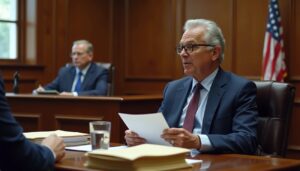How Forensic Accounting Can Save a Business from Financial Disaster
Imagine this: cash flow looks fine on paper, but the bank balance keeps shrinking. Invoices don’t match up, expenses seem inflated, and profit margins have quietly thinned. Something doesn’t add up, and it’s not just the math.
This is where forensic accounting becomes more than just a service. It becomes a lifeline.
Every year, businesses large and small lose billions to financial fraud, theft, and reporting errors. According to the Association of Certified Fraud Examiners, the typical organization loses about 5% of its annual revenue to fraud. That’s enough to push many companies into the red, or worse, bankruptcy.
When these red flags appear, most owners call their accountant or internal auditor. But routine accounting often misses what hides between transactions. Forensic accounting, on the other hand, is built to uncover the truth behind the numbers. It doesn’t stop at the balance sheet. It investigates it.
At Joey Friedman CPA PA, Mr. Friedman and his team often describe forensic accounting as “the process of giving numbers a voice.” That voice tells the story of what really happened, where the money went, who moved it, and how to prevent it from happening again.
Why Financial Fraud Can Destroy a Business
Financial fraud rarely starts with millions missing overnight. It usually begins quietly. It could be a small unauthorized payment, an overlooked adjustment, or a “temporary” transfer that becomes permanent. Left unchecked, these small cracks spread until the financial foundation of the business weakens.
- Fraud and financial misconduct don’t just drain resources; they damage credibility. Investors lose trust, vendors hesitate, and clients question reliability. Legal action can follow, and insurance rarely covers the true cost, which includes time, reputation, and peace of mind.
- In Florida, where businesses are growing rapidly and competition is intense, one overlooked financial issue can ripple fast. A sudden accounting discrepancy can halt growth plans, stall investments, or even lead to regulatory action. This is why forensic accounting in Florida is more than a safety measure; it’s a form of protection that secures a company’s long-term stability.
What Is Forensic Accounting and Why Does It Matter?
In simple terms, forensic accounting is the practice of examining financial information for evidence of misconduct, fraud, or error. It blends accounting expertise with investigative techniques and often supports legal action.
Unlike traditional accounting, which focuses on reporting and compliance, forensic accounting focuses on discovery and verification. It asks, “What really happened?” instead of just “What’s reported?”
A forensic accountant reviews ledgers, banking records, and transaction trails, not just to balance the books, but to verify that every figure tells the truth. This process can reveal hidden assets, unapproved transactions, or even accounting manipulation that was never meant to be seen.
Mr. Friedman explains it best: “Forensic accounting looks beyond what’s visible. It finds patterns, connects the dots, and uncovers what others overlook. That’s how you protect a business before it’s too late.”
How Forensic Accounting Finds the Hidden Problem
Financial disasters often begin with undetected irregularities. To find them, forensic accountants rely on a structured, fact-based approach. Here’s how the process typically works.
-
Transaction Tracing
This step follows the flow of money through bank accounts, vendor payments, and reimbursements. A skilled accountant looks for unusual transfers, round-number transactions, or payments to unfamiliar entities. These small details often expose large-scale problems.
-
Data Analysis
Modern forensic accountants use advanced software to identify anomalies. If a vendor receives repeated payments just below approval thresholds or expenses appear in suspicious time frames, those are red flags.
-
Document Review
Invoices, contracts, receipts, and correspondence are compared for consistency. The goal isn’t just to check documents, but also to connect them. When an invoice doesn’t align with a shipping record or payment date, the truth starts to emerge.
-
Employee and Vendor Interviews
Sometimes the story comes not from numbers, but from people. Forensic accountants interview staff and external parties to confirm details and identify inconsistencies in testimony or records.
-
Reporting and Collaboration
Once findings are established, the forensic accountant prepares a detailed report. This report can be shared with management, legal teams, or even used in court. In many cases, forensic expert witnesses play a crucial role in explaining complex findings clearly and credibly during litigation.
Through this process, forensic accounting doesn’t just solve a problem, but also works to strengthen internal systems so that it doesn’t happen again.
Practical Steps Businesses Can Take
Even the most honest business can fall victim to internal fraud or accounting errors. The key is prevention and early detection. Here’s how organizations can protect themselves before financial trouble takes root.
-
Strengthen Internal Controls
Assign clear responsibilities. No single employee should have control over all stages of a financial process, such as creating vendors, approving payments, and reconciling accounts. Separation of duties makes fraud harder to commit and easier to detect.
-
Review Financial Data Regularly
Monthly reviews by an accounting expert can reveal inconsistencies early. Mr. Friedman recommends analyzing not just totals, but trends by comparing ratios, vendor histories, and timing of payments.
-
Encourage Whistleblower Reports
Many fraud cases are first uncovered through employee tips. Create a safe and confidential system for reporting unusual activity. This culture of accountability often prevents small issues from becoming large crises.
-
Secure Digital Access
As most accounting systems move online, unauthorized access can lead to silent theft. Use secure logins, multi-factor authentication, and audit logs that track who makes each entry.
-
Act Quickly When Suspicion Arises
Once irregularities are suspected, time is critical. Financial evidence can disappear quickly. A forensic accountant should be contacted immediately to review records and secure relevant data before it’s altered or deleted.
When done early, this process can stop financial damage in its tracks. That’s the value of having a trusted expert like Mr. Joey Friedman in your corner, not just when things go wrong, but before they ever do.
The Tools That Make the Difference
Forensic accounting has evolved far beyond calculators and spreadsheets. Today’s forensic accountants rely on specialized tools that make investigations precise and reliable.
- Forensic Software: Applications like IDEA and ACL allow accountants to analyze thousands of transactions quickly, spotting trends that manual reviews would miss.
- Data Visualization Tools: Graphs and flow maps help reconstruct how money moves between accounts or entities.
- Secure Evidence Management Systems: These preserve documents in their original form and maintain a verifiable chain of custody.
- Analytical Scripts: Custom-built formulas and scripts identify duplicate payments, abnormal rounding, or hidden relationships between accounts.
Each of these tools helps forensic professionals like Mr. Friedman move beyond suspicion to proof. It’s about accuracy, making sure findings stand up not just in boardrooms, but also in courtrooms.
When to Call a Forensic Accountant
Most businesses reach out to a forensic accountant when a problem has already surfaced, such as missing funds, unexplained losses, or audit findings that don’t make sense. But waiting until losses are visible often means the damage has already been done. The best time to call is the moment something feels “off,” even if you can’t yet identify what it is.
Forensic accountants aren’t just for crisis response; they’re also prevention experts. Their job is to detect irregularities early, investigate them quietly, and provide management with facts before issues escalate.
Here are some warning signs that suggest it’s time to bring in a specialist:
- Financial statements don’t align with cash flow: Your profit and loss report shows strong earnings, but your bank balance tells a different story. This mismatch often signals unrecorded liabilities, manipulated entries, or concealed transactions.
- Repeated vendor or client disputes: Frequent billing corrections or duplicate payments could mean accounting errors or deliberate manipulation.
- Unexplained spikes in employee expenses: Sudden changes in reimbursement trends might indicate false claims or misuse of company funds.
- Delayed or inconsistent reconciliations: When bank accounts or ledgers take longer to balance, it’s a sign that something isn’t being reported accurately.
- Whistleblower reports or employee concerns: These should always be taken seriously. Even a minor claim can lead to major findings.
For businesses in Miami, where transactions move fast and digital payments dominate, these warning signs can appear subtly but snowball quickly.
The Bigger Picture — Protecting the Future
Forensic accounting isn’t about blame. It’s about clarity. It helps businesses understand where weaknesses exist and how to correct them before they turn into costly crises.
Whether the goal is to recover lost funds, prepare for litigation, or simply confirm that operations are clean, the process restores trust, internally and externally.
At Joey Friedman CPA PA, every engagement follows one guiding principle: transparency protects success. Mr. Friedman’s approach combines technical skill with sound judgment and discretion. His work reminds business owners that numbers alone don’t tell the story — integrity does.
By investing in proper financial oversight and partnering with experienced forensic accountants, businesses protect more than their bottom line. They protect their reputation, relationships, and future growth.
Conclusion: Don’t Wait for the Warning Signs
Financial disasters rarely announce themselves. They build quietly transaction by transaction until discovery comes too late.
Forensic accounting offers a way to catch problems early, understand their source, and restore stability before real damage occurs.
If your financial records don’t feel right, or if you simply want to safeguard your organization, this is the time to act.
Schedule a Consultation with Joey Friedman CPA PA
If you suspect financial irregularities or want to strengthen your company’s internal controls, reach out to Joey Friedman CPA PA.
Mr. Friedman and his team specialize in thorough, discreet, and results-driven forensic accounting services designed to protect your business before disaster strikes.
Contact Joey Friedman CPA PA today to discuss your situation confidentially.





